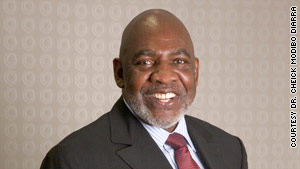Dr. Cheick Modibo Diarra is Africa Chairman for Microsoft Corporation. He writes for Africa 50,
He was Nasa's First African Astrophysicist
“Working at NASA has done a great thing for me in the sense that I wanted the youth of Africa to realize that your potential really is unlimited — it depends on you.”
Now as Africa Chairman Microsoft..
I strongly believe that technology does not generate development alone; it must be part of a mix of sound government policies, enhanced workforce skills and infrastructure investments.
Increasing connectivity or distributing computers and software will have limited impact on development without investment in Africa's most important resource -- its people.
The fuel that feeds every flourishing economy is jobs and business development, and expanding educational opportunities and digital literacy in communities is critical to broadening social and economic opportunity.
Without this holistic approach, access to technology will do little to alleviate Africa's challenges or improve the lives of underserved communities as they will not have the knowledge to harness the opportunities that ICT offers.
In most parts of Africa, relatively few computer users have the expertise to develop ICT products or provide critical IT services. A shortage of skilled workers in this field makes organizations reluctant to invest in ICT, thereby curtailing domestic demand and leaving fewer opportunities for local firms.
A chronic shortage of skilled technology workers impairs competitiveness, not only in the ICT sector -- potentially one of the fastest growing areas of the local economy -- but in many other more traditional sectors as well.
At Microsoft, we believe that high-level technology skills have a multiplier effect on employment: the more highly-qualified people there are, the more people with entry-level skills can be absorbed by the industry.
The great leap for Africa will come through the transformation of the small-and-medium-enterprise sector, by giving this vital growth engine long-term sustainability through the skills and capabilities of its entrepreneurs and employees.
With decades of corporate social responsibility experience working to improve education, eliminate poverty and increase workforce participation around the globe, we have come to realize that any sustainable improvement has to be led and owned by national institutions and societies.
Without a foundation of effective leadership, management, accountability and proper incentive, development objectives cannot be achieved in a sustainable way.
But if we work in partnership to provide the right infrastructures and the right opportunities then the citizens of Africa will do the rest.
Friday, January 28, 2011
Subscribe to:
Post Comments (Atom)

No comments:
Post a Comment